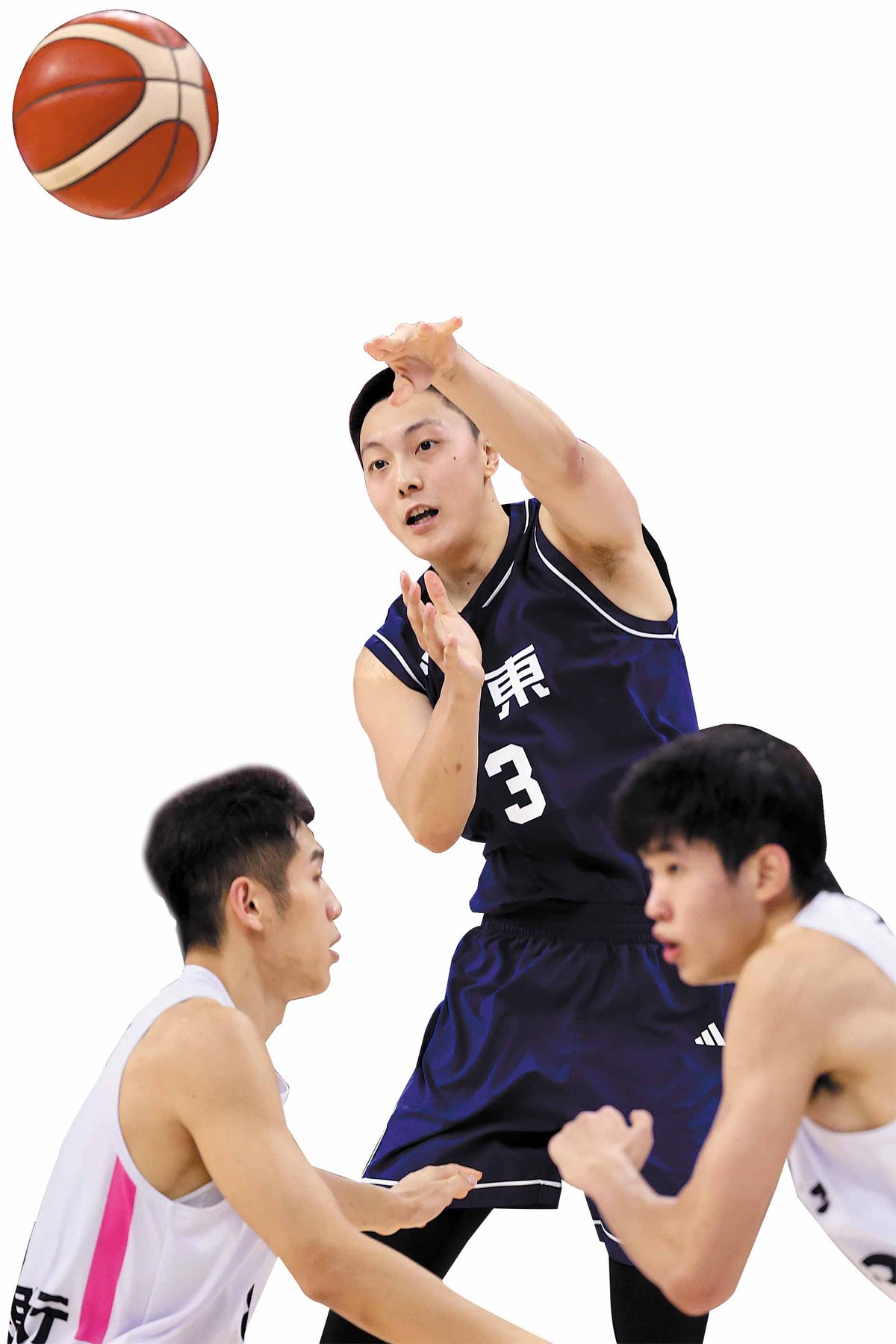
Guangdong player Hu Mingxuan (center) passes the ball during the men's basketball final at the National Games in Dongguan, Guangdong province, on Nov 12. Guangdong triumphed over Zhejiang province with a commanding score of 101-65. WEI XIAOHAO/CHINA DAILY
On Saturday, the Dongguan Basketball Center in Guangdong province was packed to the rafters — despite there being no game. Instead, the Guangdong Southern Tigers hosted a fan carnival that drew thousands of supporters.
Under bright lights, 22-year-old Cui Yongxi received his new No. 24 jersey. A product of the city's basketball system, Cui returned this summer after a year that saw an injury end his time with the Brooklyn Nets in the prestigious NBA. After undergoing rehabilitation, he is now preparing for the new domestic CBA season.
The excitement in the arena echoed the recently concluded 15th National Games, with the men's basketball tournament held in Dongguan. Roared on by the home crowd, the Guangdong men's team claimed gold — its first in 12 years.
That success, combined with a booming basketball market, has cemented Dongguan's standing as China's "Basketball City".
The city has become a magnet for talent, drawing promising players from across the country while also exporting its own to leagues and programs nationwide — whether the national team, the CBA, or the Chinese University Basketball Association (CUBAL).
In Dongguan, professional basketball and grassroots games enjoy equal popularity. The city's stable economic growth supports sustained investment in sports, while private capital continues to flow back into basketball programs — passion and professionalism drive one another forward.
At the National Games, Guangdong swept all three five-on-five men's titles — senior, U22, and U18 — thanks in large part to Dongguan's talent pipeline.
Senior team mainstays Hu Mingxuan, Xu Jie, and Du Runwang all developed their skills at Dongguan Sports School.
Yumiti Saidake, a standout in the U22 team originally from the Xinjiang Uyghur Autonomous Region, was spotted by grassroots coaches and brought to Dongguan's Guangming High School before turning professional.
The U18 team is made up largely of young players developed by Dongguan Basketball School and Dongguan Sports School.
Dongguan's influence extended well beyond its own representatives. In the men's U22 bronze-medal game, Beijing beat Shanghai 71-64 to earn its first basketball medal in 42 years.
With two minutes left, Beijing's Shi Kui hit a crucial three, then grabbed a steal and scored a layup to seal the win. "At the final moment of the game, you just feel a sense of responsibility," Shi said. "Even though I missed a few threes earlier, I knew I had to keep shooting and trust myself."
Born in Dongguan in 2003, Shi grew up playing in local school leagues. In the 2017 Dongguan middle school league final, he scored 60 points to almost single-handedly carry Tung Wah Junior High School to the championship. He is now captain of Tsinghua University's men's team, with two CUBAL titles.
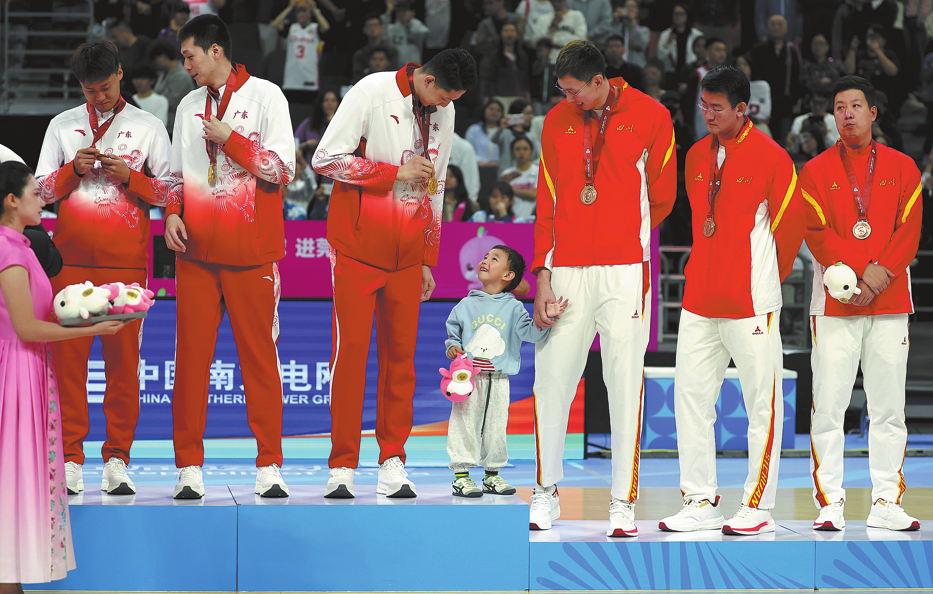
Players from the Guangdong (left) and Sichuan teams stand on the podium during the medal ceremony for the men's basketball final at the National Games on Nov 12. WEI XIAOHAO/CHINA DAILY
Club, city in unison
That steady flow of talent — whether toward universities, the CBA, or the national team — can ultimately be traced back to the same source, a city where the professional club and the grassroots system have grown side by side for decades.
"If you want to truly understand Chinese basketball, you must go to Dongguan," former Chinese Basketball Association vice-chairman Li Yuanwei once said in an interview. The city pairs one of China's most successful pro clubs with one of its most vibrant grassroots cultures.
Nearly every resident feels a sense of identity anchored to the sport, which has become woven into the city's fabric.
The Guangdong Southern Tigers, founded in 1993 by Dongguan entrepreneur Chen Lin as China's first privately owned professional basketball club, lie at the center of this rise.
Over three decades — and now playing in the NBA-standard Dongguan Basketball Center, which was completed in 2014 — the team has won 11 CBA titles, the most in the league's history.
"The growth of basketball in Dongguan has always paralleled the city's overall development," said Wang Chenzheng, who has spent more than a decade covering the Guangdong Southern Tigers for Dongguan Daily media outlet.
Dubbed the "world factory", Dongguan's rapid economic growth helped fuel its basketball boom. Conversely, without the club's national titles generating citywide excitement, the basketball culture might not have become so strong. "If there weren't grassroots fans who loved basketball this much, the club wouldn't have been able to take root here," Wang said.
From the start, the Southern Tigers recruited top young talent nationwide. As the pioneering generation retired, the club built a youth system in partnership with the Guangdong Provincial Sports Bureau. This structure produced stars such as Zhu Fangyu, Du Feng, and Yi Jianlian — names that define modern Chinese basketball.
"At the National Games, many players representing Guangdong may not have been born here, but almost all were developed here," Wang said.
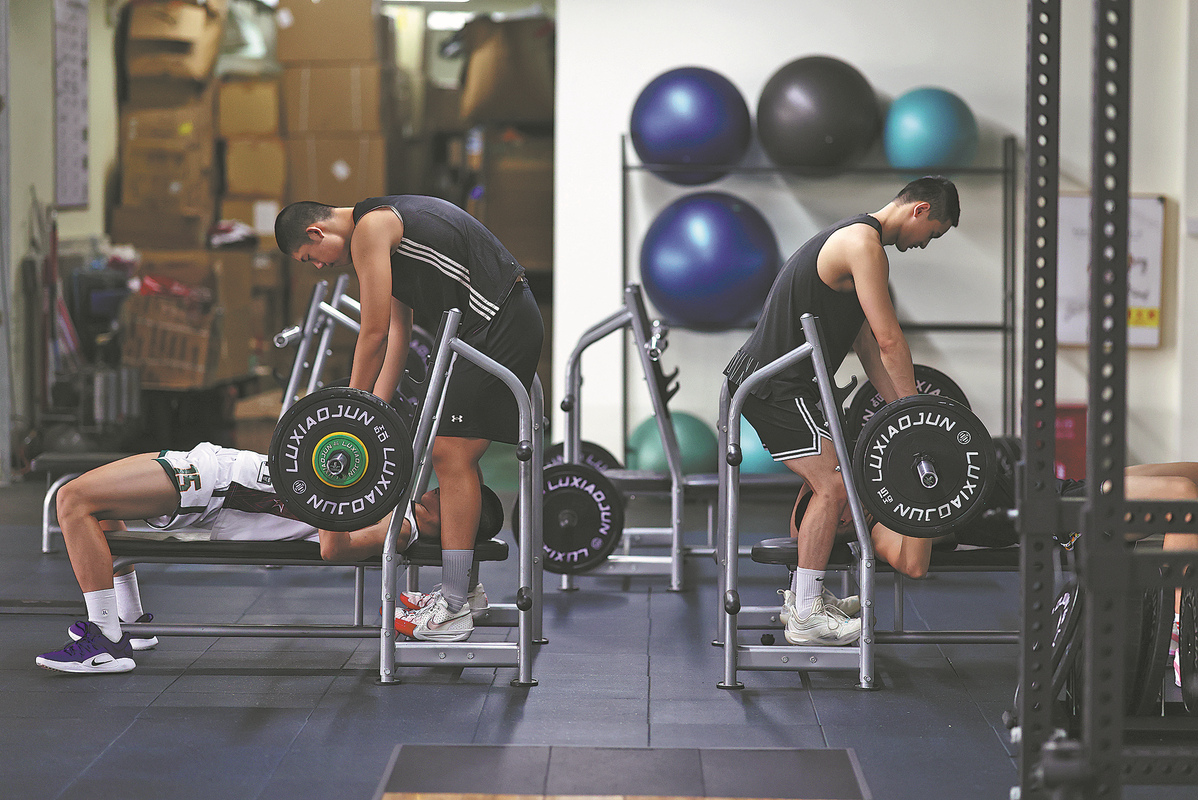
Middle school students train at Dongguan Basketball School on Nov 12. WEI XIAOHAO/CHINA DAILY
Youth development
For Wang and many others, the presence of the Southern Tigers is the source of Dongguan's basketball talent production line.
After retiring, many players stay in the city and return to grassroots communities as coaches. The professional and amateur scenes feed off each other.
Much of this ecosystem can be traced back to Li Qun, principal of Dongguan Basketball School. Originally from Heilongjiang province, Li joined the Southern Tigers as a player in 1995 and became head coach in 2006. He eventually shifted his focus to youth development, founding the school in 2011 to train players aged 12 to 17.
"Children start receiving systematic, high-level training from a very young age," he said. "Our goal has always been to develop professional players."
The school has sent athletes to the national team, the CBA, the CUBAL, the National Collegiate Athletic Association in the US, Australia's National Basketball League and beyond — including Cui Yongxi, former CBA No. 1 pick Ou Junxuan, and several current CBA players.
In September, Cui became the seventh Chinese player to appear in an NBA regular-season game when he debuted for the Brooklyn Nets. After an injury in December, he returned to China in August to join the Southern Tigers.
Registered with Guangdong's U22 team for the National Games, he stayed behind to rehab — splitting his time between team practices and strength sessions at his old school in Dongguan.
"My muscle size and strength are back to about 90 percent, but my nerve reflexes and explosiveness are around 70 to 80 percent," he said. "Of course, I want to return to the court as soon as possible, but I have to wait until all the test results are clear."
Cui first arrived at the school in 2015 as a 12-year-old from the Guangxi Zhuang autonomous region. "It was my first time away from home. At first, I felt free — training and living with other students was tiring but fun."
Li remembers persuading Cui's parents to send him to Dongguan. He still takes Cui to the United States annually for specialized training. "Even if they're already national team players, they must continue improving to build better careers," Li said.
For Li, his own childhood dream was just competing at the National Games. And when Cui appeared in the NBA last year, Li watched almost every game.
"The most important thing is that he's given hope to Chinese kids — showing that even without the physical gifts of Yao Ming or Yi Jianlian, you can still reach the world's biggest stage. You can make up for less-ideal physical attributes through effort and truly meet the NBA standard. That message is crucial."
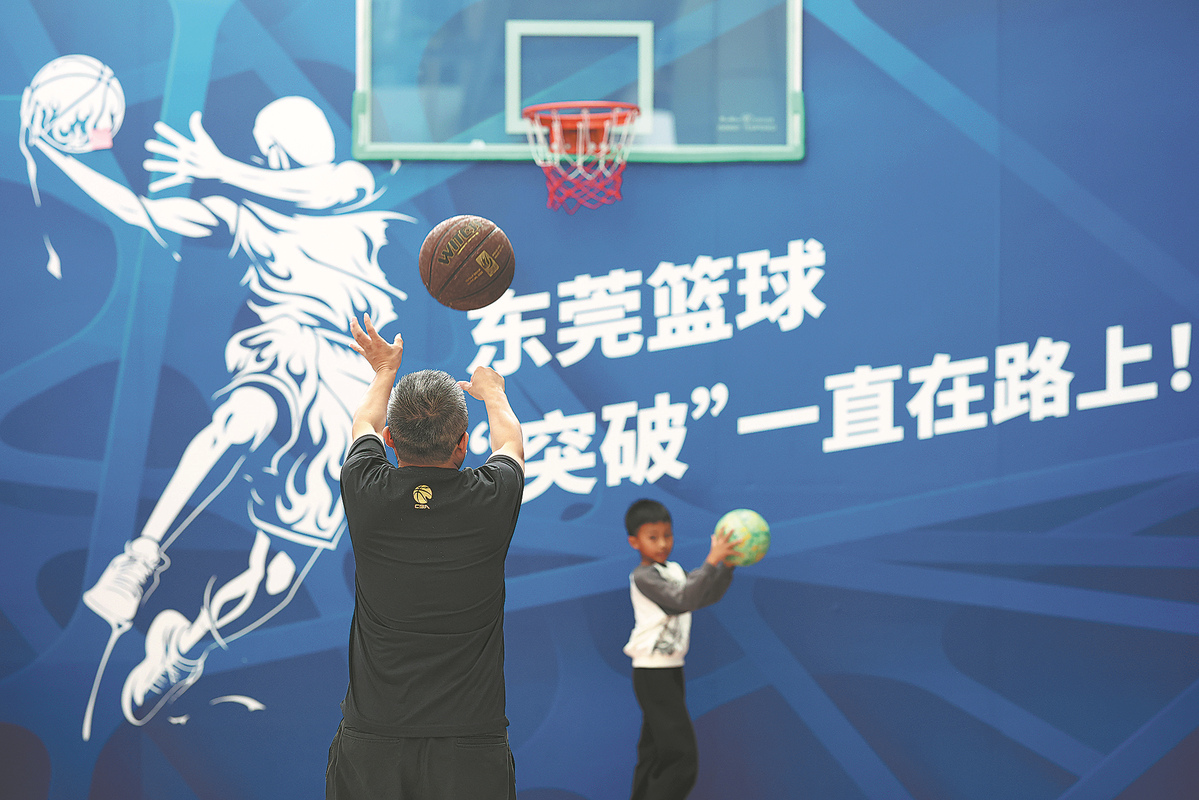
Visitors try shooting hoops during a basketball-themed exhibition at Dongguan Exhibition Center on Nov 12. WEI XIAOHAO/CHINA DAILY
Deep integration
Li also emphasized the key role of investor Liang Zhibin, a well-known Dongguan entrepreneur, in the development of the sport. "The school isn't a business project in the traditional sense — commercial operations cover basic expenses, but profit isn't the goal. It's about passion and nurturing talent," he said.
"For us, producing top-level players who can serve the nation or the province is the greatest honor."
Liang also owns the Shenzhen Leopards, a CBA club founded in Dongguan, whose youth system is built around Dongguan Basketball School, continuing the flow of talent to the CBA.
Beyond specialized academies, public schools support the city's "closed-loop" pipeline. Dozens of basketball-focused schools — including Dongguan No. 4 High School and Guangming High School — offer integrated training and competition opportunities.
Partnerships such as that between the Southern Tigers and Guangdong Experimental High School further refine the city's model of sports-education integration. Standout street basketballers and academy-trained players form a multilayered talent pool.
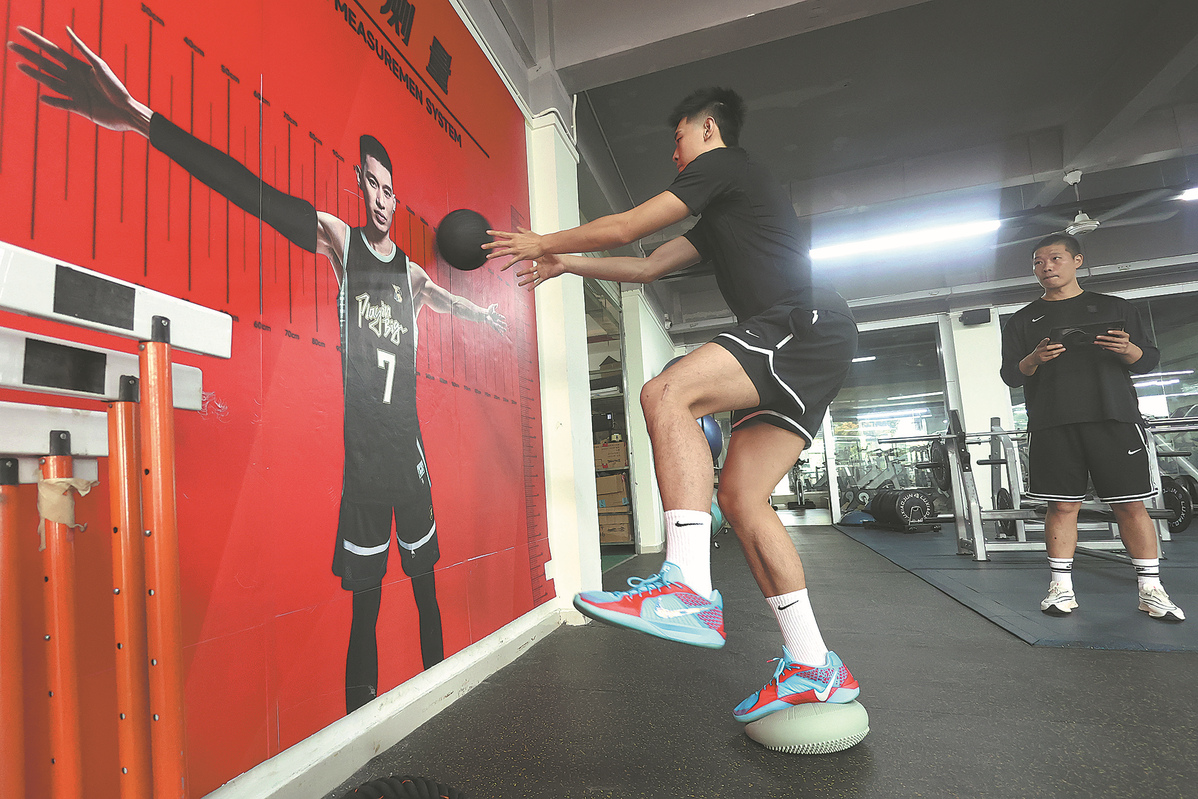
Cui Yongxi trains at Dongguan Basketball School. A mural of ex-NBA player Jeremy Lin serves as motivation for aspiring young players. WEI XIAOHAO/CHINA DAILY
To strengthen this system, Dongguan Sports School, Dongguan Basketball School, Dongguan No. 4 High School, Guangming High School, and the Dongguan Exhibition Center recently launched a collaborative platform combining training, competition, education, and cultural immersion.
Dongguan's basketball identity now extends into culture, art, and urban life. Since 2021, the city's iconic basketball-themed sculpture "Laura" has received a makeover each year — reflecting its dual identity as both a "national basketball city" and "China's trendy toys capital".
In Dongguan, basketball intersects with youth culture, intangible cultural heritage, philanthropy, rural vitalization, talent development, and innovation.
"In Dongguan, everything can connect with basketball," Wang said.






